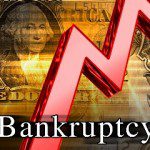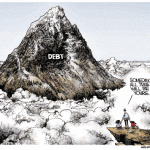Automatically receive the internet’s most informative articles bi-weekly via our free bi-weekly Market Intelligence Report newsletter (sample here). Register in the top right hand corner of this page.
The budgets of most advanced economies, excluding interest payments need 20 consecutive years of surpluses exceeding 2% of gross domestic product – starting now – just to bring the debt-to-GDP ratio back to its pre-crisis level.
excluding interest payments need 20 consecutive years of surpluses exceeding 2% of gross domestic product – starting now – just to bring the debt-to-GDP ratio back to its pre-crisis level.
By Lorimer Wilson, editor of munKNEE.com
According to the Bank for International Settlements, if only one of the following three conditions is met, the increased financial burden imposed by ageing populations and lower growth will make it unlikely that indebted economies will be able to grow out of their debt problem:
- government debt is more than 80% to 100% of GDP;
- non-financial corporate debt is more than 90%;
- private household debt is more than 85% of GDP.
The Boston Consulting Group (BCG) adds that if the overall debt load continues to grow faster than the economy, then large-scale debt restructuring becomes inevitable.
To prevent a vicious upward debt spiral from gaining momentum the authors urge policy makers to:
- act quickly and decisively
- aim for an overall debt level well below 180% for the private and government sector based on the assumption that governments, non-financial corporations, and private households can each sustain a debt load of 60% of GDP, at an interest rate of 5% and a nominal economic growth rate of 3% per year. Lower interest rates and/or higher growth would help reduce the debt burden further.
Source: Wikipedia
To see an up-to-the-second visual of the debt picture of certain countries visit the links below:
1. World (by country): http://www.usdebtclock.org/world-debt-clock.html
2. U.S.A.: http://www.usdebtclock.org/
3. Canada: http://www.nationaldebtclocks.org/debtclock/Canada
4. U.K.: http://www.nationaldebtclocks.org/debtclock/unitedkingdom
5. Australia: http://www.nationaldebtclocks.org/debtclock/australia
The above article was written by Lorimer Wilson, editor of munKNEE.com and the FREE Market Intelligence Report newsletter (sample here). This paragraph must be included in any article re-posting to avoid copyright infringement.]
1. How Likely Is the Fed to Go Bust & What Would it Mean For YOU?
At this point, thanks to a long-standing policy of wanton money printing, the Fed has more liabilities than ever before in its history – by an enormous margin – and this precarious balance sheet is dangerous, because if the Fed goes bust, everyone loses [- including YOU. Let me explain why that is the case].
2. Rapid Rise In Interest Rates Will Collapse U.S. Financial System – Here’s Why
There is one vitally important number that everyone needs to be watching right now, and it doesn’t have anything to do with unemployment, inflation or housing. If this number gets too high, it will collapse the entire U.S. financial system. The number that I am talking about is the yield on 10 year U.S. Treasuries. Here’s why.
3. Economics Can’t Trump Mathematics & the Math Says US In a Debt Death Spiral
The madmen who are responsible for the coming economic disaster continue to behave as if they can manage to avoid it. Violating Einstein’s definition of insanity, they continue to apply the same poison that caused the problem. These fools believe they can manage complexities they do not understand. We are bigger fools for providing them the authority to indulge their hubris and wreak such damage.
Anyone that thinks that the U.S. economy can keep going along like this is absolutely crazy. We are in the terminal phase of an unprecedented debt spiral which has allowed us to live far, far beyond our means for the last several decades. Unfortunately, all debt spirals eventually end, and they usually do so in a very disorderly manner.
5. Why the End of This Economic Death Spiral Is So Hard to Call
Whether you are an investor, concerned citizen or merely someone trying to understand the current economic situation, you should be worried. Watch this video to get an outstanding overview of what is occurring. It is probably the best short explanation as to why the end of this economic death spiral is so hard to call.
6. Lessons of 2008 Forgotten – Debt Threatens to Undo the World Again
Little has been done in the past six years to restructure economies and cut debt i.e. learn the lessons of 2008. Because we’ve partially recovered from that traumatic period, that’s led to complacency. All the while, the debt that caused the bust in the first place has compounded and threatens to undo the world again. Let’s hope it doesn’t come to that.
7. Another Crisis Is Coming & It May Be Imminent – Here’s Why
Is there going to be another crisis? Of course there is. The liberalised global financial system remains intact and unregulated, if a little battered…The question therefore becomes one of timing: when will the next crash happen? To that I offer the tentative answer: it may be imminent…[This article puts forth my explanation as to why that will likely be the case.]
8. Japan: A Country On the Brink of Fiscal & Economic Disaster!
I wrote several years ago that Japan is a bug in search of a windshield and in January I wrote that 2013 is the Year of the Windshield. Japan is a country that is on the brink of fiscal and economic disaster.
9. “Ponzi Finance”: What Must Happen To Bring It To An End?
The Boston Consulting Group has issued a paper that recommends 10 steps that developed countries must take to end what they refer to as ‘Ponzi finance’ and to return to a sustainable growth path but I believe their recommendations to be but theoretical and impractical constructs. While I believe we face – and will experience – interesting, speculative, fragile, and very challenging and very likely life-changing times going forward, I believe that the only thing that will force developed country politicians to work for common purposes is a further global financial crisis. This article provides an overview and assessment of said paper and the rationale for my position.
10. Gov’t Debt Will Keep Increasing Until the System Implodes! Are You Ready?
Why are so many politicians around the world declaring that the debt crisis is “over” when debt-to-GDP ratios all over the planet continue to skyrocket? The global economy has never seen anything like the sovereign debt bubble that we are experiencing today. This insanity will continue until a day of reckoning arrives and the system implodes. Nobody knows exactly when that moment will be reached, but without a doubt it is coming. Are you ready?
“The end of the world as we know it” is what David Korowicz predicts is coming sometime this decade – an “ultimate” crash that will be irreversible – TEOTWAWKI!
12. Nothing Can Be Done to Avoid Coming World-wide Depression! Here’s Why
Governments everywhere are becoming more distressed and desperate as economic realities dominate the political doublespeak. The world is at a dangerous point. Much of what we thought we knew and assumed regarding governmental behavior and economics is beginning to be reassessed. Governments of the world are out of money and out of ideas. The Ponzi scam that has been perpetrated for over fifty years is collapsing under its own weight. There are not enough suckers and capital left to sustain the fraud. [Let me explain further.]
13. “This Time is Different: Eight Centuries of Financial Folly” – A Book by Reinhart and Rogoff
Highly leveraged economies, particularly those in which continual rollover of short-term debt is sustained only by confidence in relatively illiquid underlying assets, seldom survive forever, particularly if leverage continues to grow unchecked.
 munKNEE.com Your Key to Making Money
munKNEE.com Your Key to Making Money










There’s something to be said about tackling your debt. You don’t have to pay it off all at once (who can?), but if you start to make a dent in it it becomes easier to tackle overall. There’s no reason to feel you can’t handle your debt because you can snowball the payments and feel accomplished.